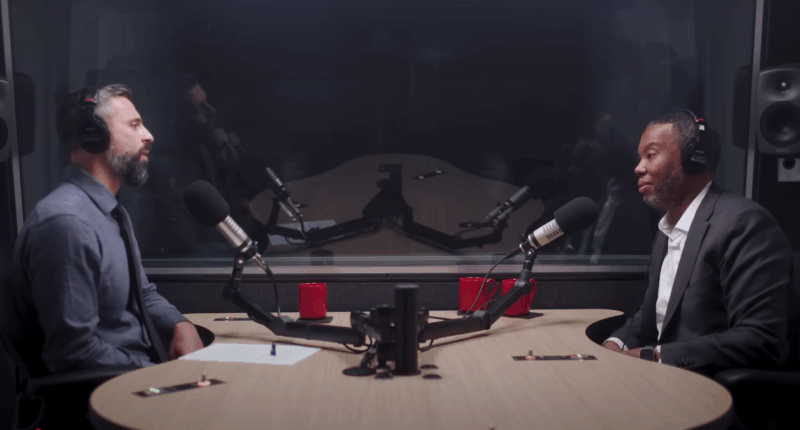With each passing day it becomes more obvious that the left has become incapable of rational debate or political compromise, and must now embrace the only tools available to it: intimidation, coercion, and political violence. Whatever liberals might believe about their progressive politics, today their program is based not on persuasion or representation, still less on open-minded rational inquiry or practical solutions to problems. It’s based on force.
The assassination of Charlie Kirk last month is of course emblematic of what the left has become. Kirk was murdered for speaking out against transgenderism. Dissenting from that ideology in particular is intolerable for the left because it encapsulates an ideal of total liberation — even from nature itself. But there are plenty of examples just from the past week of the left resorting to violence, or threats of violence, to advance their cause.
Call it the assassin’s or rioter’s veto — the last tactic of a liberal project that has reached an intellectual and political dead-end in the aftermath of Kirk’s assassination.
Consider the cancellation of a Federalist Society event scheduled for Oct. 7 at New York University Law School, which cited “security reasons” and fears that anti-Israel protesters would disrupt it. The event was to feature conservative legal scholar Ilya Shapiro discussing his new book, Lawless: The Miseducation of American Elites.
Shapiro is Jewish, and has been critical of campus anti-Israel protests in the past — the same sort of protests NYU officials anticipate on Oct. 7, and which, according to reporting from The Washington Free Beacon, the school is apparently unable to control. And yet, as the Beacon further reported, the law school “is slated to host a seven-hour symposium on ‘social entrepreneurship, impact investing, and sustainable development’ that same day.” They don’t fear riots over that event, but cannot (or will not) guarantee the safety of Shapiro’s event.
What’s more, for weeks now law school officials have been changing their justification for why they canceled the event, alternatively citing the threat of protests, a conflicting “private event,” the inability to host outside speakers the week of Oct. 7, and lack of space.
But we all know the real reason law school officials canceled the Federalist Society event: Shapiro is Jewish and conservative, they fear antisemitic rioters will attack the event and possibly Shapiro himself, and they are unwilling to do what’s necessary to protect him.
That’s how the rioter’s veto works, and it’s become commonplace on the left for the simple reason that the left refuses to engage in debate about these things. They’ve reached the end of rational inquiry and civil dialogue, and are increasingly resorting to force.
Or consider what’s unfolded this week in Portland, where Antifa rioters have besieged an Immigration and Customs Enforcement facility and recently began attacking members of the press who dare to report on what’s happening there.
Katie Daviscourt, a reporter for The Post Millennial, was attacked by an Antifa rioter who hit her in the face with a wooden flagpole, “swinging it like a baseball bat,” in Daviscourt’s words. Portland Police were on the scene, but allowed the masked assailant to escape despite Daviscourt identifying her attacker to an officer on the scene. The next day, she appeared on Fox News and on Jack Posobiec’s show with a black eye.
The situation in Portland is a rolling example of the left’s institutionalization of political violence. The city’s police chief is denying there’s a problem at all, while a member of the city council is instructing Antifa agitators to hide their identities and use burner phones to escape prosecution. Amid the chaos, Antifa is displaying a high level of coordination as it attacks journalists and threatens ICE agents. (One clip circulating online shows Antifa members whisking away the suspect who attacked Daviscourt to a nearby safehouse, even as Portland Police stood down and refused to immediately respond to the assault.)
One could go on and on cataloguing recent examples of leftist intolerance and violence. But it’s important to understand the intellectual thread that connects all these examples, from the assassination of Kirk to the street-level violence in Portland to the institutional cowardice (or malice) of NYU Law School. That thread is what we might call the epistemic closure of the contemporary left.
That term, “epistemic closure,” became popular about 15 years ago among prominent liberal writers like Jonathan Chait and Matthew Yglesias who were trying to make the case that conservatives were trapped in an intellectual world in which the only trustworthy sources of information or analysis came from within the conservative movement or media.
Chait, responding to left-libertarian writer Julian Sanchez on this issue, argued that the reason the right displayed more tendencies toward epistemic closure than the left is because the conservative movement is ideological in a way liberalism isn’t. Liberals, argued Chait, display an open-mindedness to rational inquiry that conservatives generally lack. Why do they supposedly lack it? Responding to Sanchez’s assertion that we should “sideline the cheap partisan explanation that conservatism intrinsically appeals to the stupid or closed minded,” Chait suggests we shouldn’t necessarily sideline that explanation because, in fact, conservatives do have a simplistic and close-minded approach to politics.
However outlandish this argument was in the halcyon days of 2010, it’s the stuff of fever dreams today. No serious person in 2025, on the right or left, would argue that liberals in 2025 display an open-mindedness to rational inquiry. Indeed, the overarching feature of liberalism in the Trump era is the epistemic closure that liberals ascribed to conservatives in the Obama era: a fundamental intolerance of anyone who dissents from liberal views, and an inability to comprehend conservative ideas or perspectives.
This has been true for a long time now (it was arguably true in 2010, when Chait was smirking at the Tea Party). But what’s new is the left’s open embrace of violence, and transparently violent rhetoric, in the face of dissent and invitations to rational inquiry from the right — precisely the kind of rational inquiry that Charlie Kirk engaged in.
The manipulation of language, long a mainstay of the left, has become a hallmark of this turn to violence. I would call it Orwellian, but Orwell now appears tame by comparison. Zohran Mamdani this week declared, in a speech about how he wants to empty New York City’s jails, that “violence is an artificial construction.” This is the kind of thing people say when they’re trying to justify actual physical violence. If you define violence as an artificial construct, then you can alternately make the case that “speech is violence” — at least when the speaker is a conservative like Kirk. The arbitrariness of this way of arguing shows all the signs of what Chait and the other open-minded liberals of the 2010s would have called epistemic closure: Whether violence is itself good or bad, real or artificial, seems to depend on who is talking. Conservatives can’t be trusted because they’re conservative.
What this spells for the left is the collapse of anything like reasoned dialogue or civil debate. In a long-winded column this week in The New York Times, Tressie McMillan Cottom wove a tangled, convoluted narrative about the “Red Scare” President Trump and conservatives like Kirk have allegedly unleashed on America. Conservatives in the Trump era, she says, have “weaponized debate,” by which she means they’re befuddling the left with their arguments. Conservatives have confused liberals, for example, “about the bounds of womanhood so as to capture their angst about changing expectations of manhood,” says Cottom — a clumsy and dishonest reference to the debate over transgenderism, which the left is losing badly thanks in part to the skill of people like Kirk.
Indeed, the trans issue is helpful in exposing both the intolerance and actual violence that now defines the mainstream left. Simply having to hear conservative arguments against transgenderism, says Cottom, is “its own kind of political violence.” To say this just weeks after Kirk was murdered in front of his family by a “trans ally” for engaging in this very debate is to engage in a form of doublespeak that would, again, make Orwell blush.
The left isn’t blushing, though. Their brightest lights, such as they are, are unwilling to consider whether or not they might have walked themselves into a box canyon. A clip from a recent Ezra Klein podcast with Ta-Nehisi Coates has gone viral in part for laying bare the seething intolerance and intellectual hubris of the left.
At one point in their exchange, Klein notes that a majority of Americans disagree with transgenderism. They don’t think men should compete in women’s sports or use women’s bathrooms, and they don’t think anyone should be compelled to use preferred pronouns or affirm that men can become women. Klein says that he and Coates both know that those people are “fundamentally and morally wrong,” but asks what can be done about them, given that they are a majority in America. Klein knows that this majority will never be convinced to adopt his and Coates’ views, and he recognizes, to his credit, that this presents a dilemma: these people must be negotiated with or suppressed by force.
Coates, who says Kirk was a “hatemonger” unworthy of mourning, has no real answer. He is not concerned about the dilemma Klein is trying to get him to recognize. On the question of transgenderism, Coates believes the conservative view is dehumanizing. “If you think it is OK to dehumanize people,” he says, “then conversation between you and me is probably not possible.” That’s the line he draws.
And that’s where the left is now. Conversation, in their view, is probably not possible with the opposing side. Kirk thought it was, and he dedicated his life to it. Perhaps he was wrong. We’ll see. But for now, it’s not too much to say that Kirk’s assassin and Coates are on the same side of this question. They share the same view on civil discourse. They are not really interested in talking.
Coates and Klein and other prominent liberals can formally disavow violence all they want, but it has become impossible to deny that they belong to a political project that has no theory of mind for the right and is unable to grasp why conservatives believe the things they believe. They have arrived at epistemic closure, which is going to involve all of us. Here at the end of the line, erstwhile liberals once so proud of their open-mindedness to rational inquiry are taking refuge in the only thing they have left: the brute application of force.









